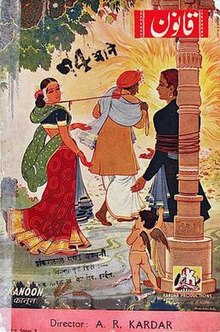1943 Indian film
| Kanoon | |
|---|---|
 Song synopsis booklet cover Song synopsis booklet cover | |
| Directed by | A. R. Kardar |
| Written by | Qabli Amritsari |
| Produced by | A. R. Kardar |
| Starring | |
| Cinematography | Dwarkadas Diwecha |
| Edited by | A. R. Kardar |
| Music by | Naushad |
| Production company | Kardar Productions |
| Distributed by | Mudnaney Film Service |
| Release date |
|
| Country | India |
| Language | Hindi-Urdu |
Kanoon also called The Law is a 1943 Indian Hindi-Urdu social film directed by A. R. Kardar. Produced by Kardar for "Kardar Productions", the film is based on a social issue involving an arranged marriage between an older man to a girl who is younger than his son.
The music director was Naushad who after Sharda (1942), once again made a young Suraiya give playback for Mehtab. The story was by Qabli Amritsari with screenplay and lyrics by D. N. Madhok. The film starred Shahu Modak, Mehtab, Gajanan Jagirdar, Nirmala Devi, Ulhas and Badri Prasad.
Plot
Ashok and Usha are friends in college who fall in love with each other. They have a common issue which unites them; the social evil of young girls forcibly married off to older men. Ashok has strong reasons as he is ashamed of his father, who has married a girl younger than Ashok. Lala Dinanath, Usha's father, is heavily in debt to Seth Hirachand. Hirachand's son, Ramesh, who studies in college with Usha, has fallen in love with her. He does not know that his father intends marrying Usha in lieu of the debt her father owes Hirachand. His attraction for Usha causes a source of anguish for Hansa, the family munim's (accountant) daughter, and hence are in service to Hirachand. Hansa and Ramesh have been childhood friends with a vague understanding of marriage between them.
When Dinanath is told by Hirachand that he would like to welcome Usha in his house, it is misunderstood as an offer of marriage for Ramesh. Dinanath agrees initially, but refuses when Hirachand lets him know his intentions of marrying Usha. Ramesh does not know about his father's proposal to Dinanath, as his father has sent him off on a family business with the Munim. Usha agrees to marry Hirachand when he threatens to take Dinanath to court over the borrowed money. A drama staged by Ashok and Usha in college forms the final part of the story. The stage play called "Kanoon" (Law) is about the social injustices against women, which force a woman to take her life. The play is watched by Hirachand who starts becoming uncomfortable as the play unfolds and rushes home, just as the protagonist in the stage play puts a gun to her head. He reaches home and dies following a heart attack.
Cast
- Shahu Modak as Ashok
- Mehtab as Usha
- Gajanan Jagirdar as Seth Hirachand
- Nirmala Devi as Hansa
- Ulhas as Ramesh
- Badri Prasad as Dinanath
- A. Shah as Munim
- Jetha
- Amirali
- Amir Bano
- Padma
Crew
- Producer: A. R. Kardar
- Director: Kardar
- Production Company: Kardar Productions
- Story: Qabli Amritsari
- Cinematographer: Dwarka Diwecha
- Editing: A. R. Kardar
- Music: Naushad
- Lyrics: D. N. Madhok
- Art Director: D. S. Malvankar, Jagnath Mistry
- Make-up: Jetha N. Lakhani
- Sound Recordist: Minoo Katrak
- Distribuors: Mudnaney Film Service
Soundtrack
The lyrics were written by D. N. Madhok. The singers were Suraiya, Shyam and Nirmala Devi.
One of the popular songs in the film was "Ek Tu Ho Ek Main Hoon" sung by Suraiya and picturised on Mehtab. Naushad, the composer, made "notable" use of trumpet and piano in the song. Suraiya had earlier given playback singing for Mehtab in Sharda (1942), when Naushad had opted for the then thirteen-year-old Suraiya. Mehtab, who was at first reluctant to have the "baby-voiced" Suraiya sing for her, was now "impressed" enough with her voice to have Suraiya playback for her.
Songlist
| # | Title | Singer |
|---|---|---|
| 1 | "Aaye Jawani Jaaye Jawani" | Suraiya, Shyam |
| 2 | "Aa More Saiyan Jiya Kalpaye" | Nirmala Devi |
| 3 | "Bolo Bolo Re Sajanwa" | Nirmala |
| 4 | "Saiyaan Khade More Dwaar Mein" | Nirmala |
| 5 | "Ek Dil Tera Ek Dil Mera" | Suraiya, Shyam |
| 6 | "Toot Gaya Ek Tara Mann Ka" | Suraiya, Shyam |
| 7 | "Ek Tu Ho Ek Main Hoon" | Suraiya |
| 8 | "Suno Fariyad Meri" | Nirmala |
References
- "Kanoon (1943)". gomolo.com. Gomolo. Retrieved 30 March 2015.
- ^ Bhaichand Patel (2012). Bollywood's Top 20: Superstars of Indian Cinema. Penguin Books India. pp. 59–. ISBN 978-0-670-08572-9. Retrieved 30 March 2015.
- "Kanoon (1943)". citwf.com. Alan Goble. Retrieved 30 March 2015.
- "Kanoon (1943)". myswar.com. MySwar. Retrieved 30 March 2015.
- "Ek Tu Ho". naushadsongs.musicworldofindia.com. Music world of India.com. Archived from the original on 3 April 2015. Retrieved 30 March 2015.
- Ashok Damodar Ranade (1 January 2006). Hindi Film Song: Music Beyond Boundaries. Bibliophile South Asia. pp. 340–. ISBN 978-81-85002-64-4. Retrieved 30 March 2015.
External links
| Films directed by Abdur Rashid Kardar | |
|---|---|
|
- 1943 films
- 1940s Hindi-language films
- 1940s Indian films
- Films directed by A. R. Kardar
- Indian black-and-white films
- Films about social issues in India
- Films about marriage
- Fiction about arranged marriage
- Indian romantic drama films
- Films about landlords
- Films about interclass romance
- Films about women in India
- Indian legal drama films
- Films shot in Lahore
- Films about theatre
- 1940s Urdu-language films
- Urdu-language Indian films